Gambling Statistics in Canada: Market Insights and Risk of Gambling Problems
With gambling entertainment availability increasing, particularly online, options to gamble are expanding and improving. As gambling statistics in Canada show, online gaming revenue has steadily climbed in recent years, mirrored by rising concerns over gambling harms.
These tendencies raise several questions. What are the underlying factors behind gambling-related issues? Is there a correlation between compulsive gambling, the expansion of internet game options, and advertising? This article delves into gambling stats to find answers to all these questions.
Key Findings
- Recent trends show that internet gambling is increasingly overtaking offline gambling operations, although it's still the most preferred form of gambling for most Canadians;
- The total Canadian gambling market ranks as 4th largest in the world, whereas the online market is 5th;
- Expenditures on gambling depend on the individual's income level;
- In Canada, the most popular gambling activity is the lottery;
- Slots are the most popular type of game at online casinos among younger age groups. For older demographics, lotteries are more prevalent;
- Gambling is more common among males and people from higher-income households;
- People from lower-income households are more prone to the risk of gambling dependency;
- Most Canadians believe gambling adverts should have additional restrictions.
Statistics of the Canadian Gambling Industry
We examined the Canadian gambling landscape to gain objective insight into its current state. The aim of this analysis was to help determine whether there's a correlation between the issues stemming from gambling and the growing availability of gambling across Canada.
Market size
While Canada's best online casinos continues to grow annually, offline games remain more popular. The most recent data shows that in 2023, Canada generated C$15.44B in revenue from gambling. The online market raked in C$4.94B out of the total gambling pie. Since 2019, due to the effects of COVID-19, there has been a drop in the total revenue of the gambling market and in offline operations in particular.
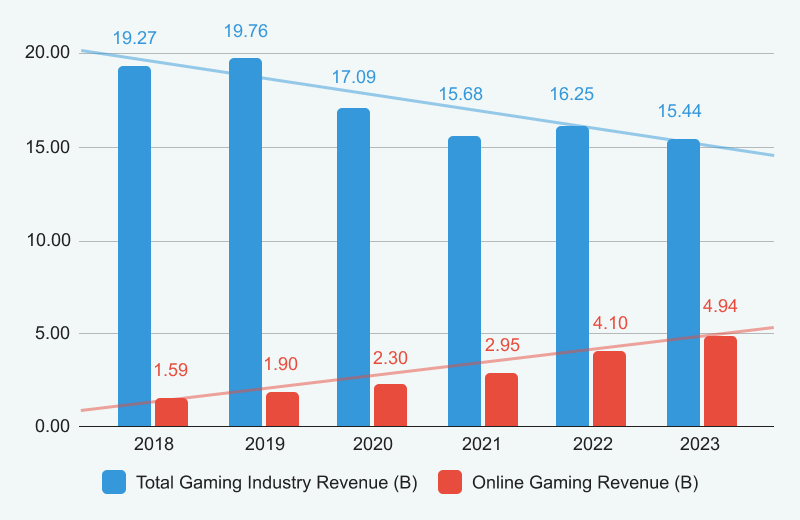
Canada's gambling industry revenue from 2018 to 2023 (data from Statista)
Although initially, it was a consequence of the closing of in-person gambling venues, most recent trends allow us to conclude Canadians increasingly lean toward online gaming.
While internet gambling revenue has continued to grow steadily, its market share has chipped at the offline operations in the past few years.
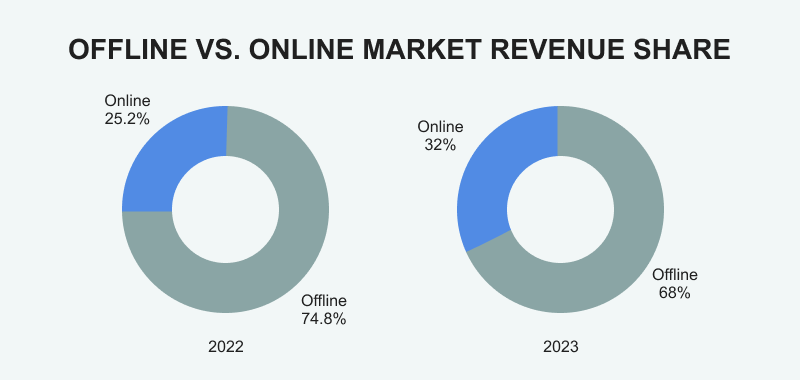
A comparison of online and offline gambling revenue (data from Statista)
The changes in market share between online and offline operations are explained by the following:
- Some businesses closed during COVID-19 and never reopened, therefore decreasing the share of the offline gambling market;
- More people are swaying toward internet games instead;
- Total revenue from gambling is on a decline as Canadians are choosing to pursue different recreational activities over gambling.
Data shows the overall size of the Canadian internet gambling market ranks among the top five markets globally by revenue in 2024, positioning Canada as the fifth largest. As for the total gambling market size, in 2022, Canada ranked as the fourth largest in the world.
Growth of Online Gambling in Canada
The growth of the online gambling industry is evident in the revenue increase that consistently shows an upward trend as it rises each year. Compared to 2017, the revenue had tripled in 2023. As for 2024, it's projected that since 2017, the revenue will have quadrupled, reaching C$5.74B.
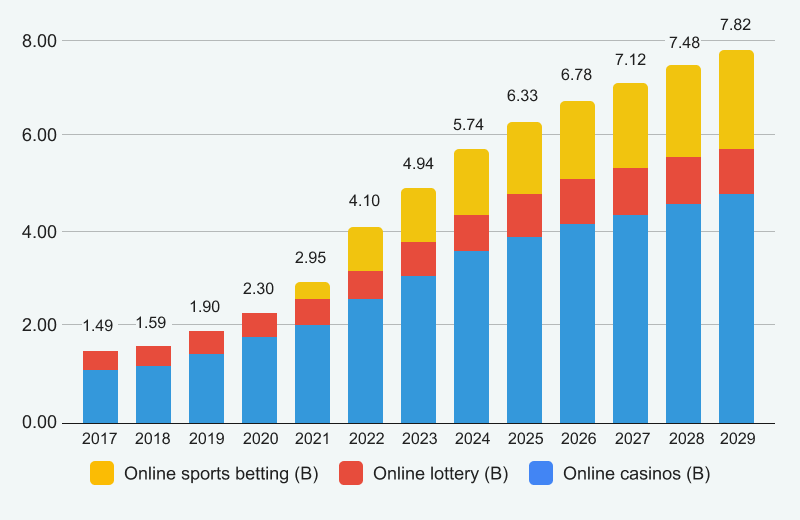
Gambling revenue by year (data from Statista)
By 2029 the market volume is expected to reach C$7.82B, which indicates a forecasted annual growth rate of 6.39%.
Online lottery revenue is gradually rising as well, with a projected growth of US$0.26B from 2023 to 2029. However, these games remain more popular offline, so the increase is less significant when compared to sports betting or casinos.
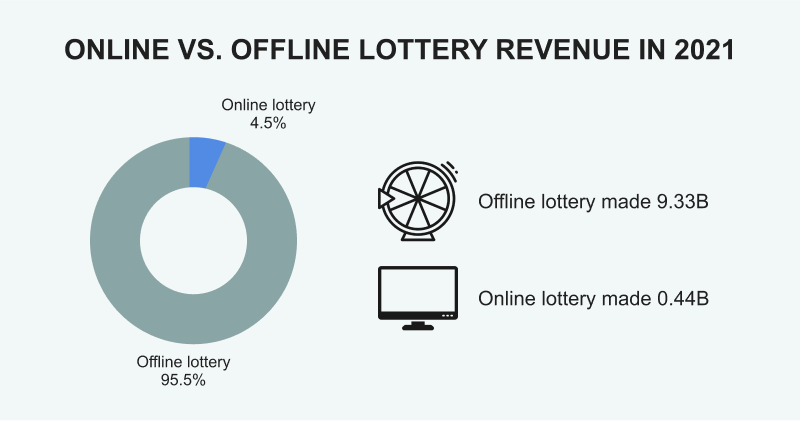
A comparison of online and offline lottery revenue (data from Statista)
For comparison, sales of regular tickets in 2021 in Canada reached C$9.33B – meanwhile, revenue of online counterparts was US$0.44B. The offline market still overpowers the online sales by bringing in 95.5% of the total revenue.
How Many Canadians Are Gambling Online
The most recent data shows that in 2023, across all forms of online gambling, there were 30.3 million users. As a result of the legalization of sports betting, the majority of online gambling users are sports bettors.
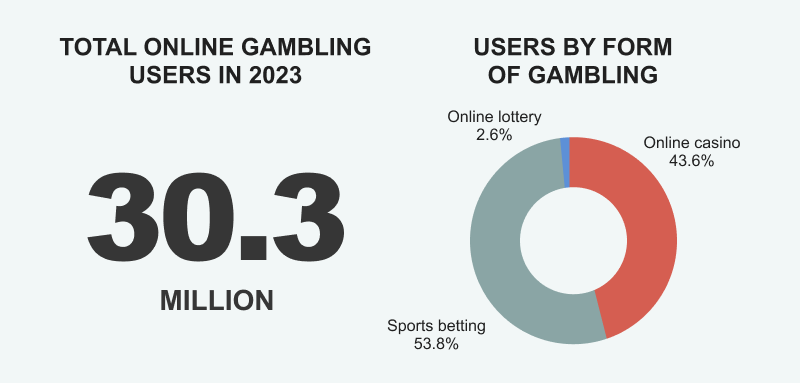
Online gamblers in 2023 (data from Statista)
Legalized single-event sports betting is a relatively recent development in the gambling industry, but it already has had a profound impact. It's an important baseline of gambling behaviour shift in recent years. Let's explore these changes in more detail.
Online Gambling User Changes
Regarding the total number of online gamblers, it is steadily growing. Single-event sports betting in Canada was made legal in 2021 resulting in a remarkable uptick of new users. In 2023, sports betting users surpassed online casino users and it's expected to maintain this trend in the upcoming years.
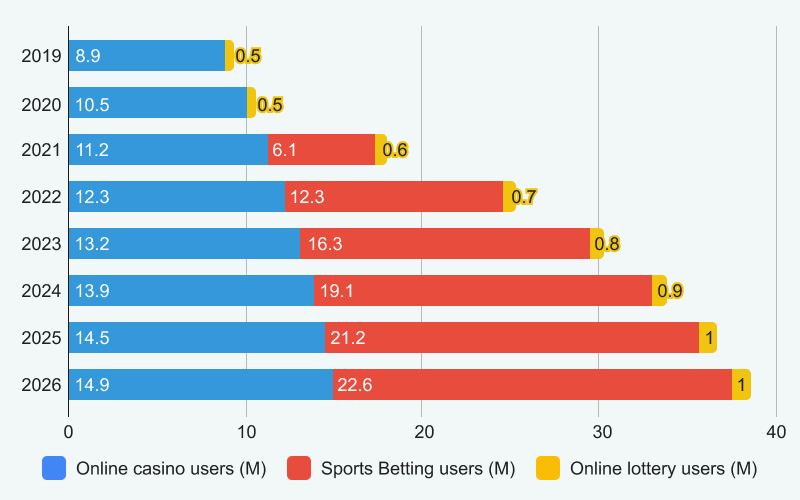
User changes for different gambling activities (data from Statista)
Although in 2023, 3.1 million more players were engaging in sports betting than in casino games, the revenue from online casinos still measured 2.5 times more than from sports betting.
Statista Market Insights predicts that the number of sports bettors will continue rapid growth by a few million users annually and will gradually slow down by 2025. Data on users engaging in online lotteries had a slight annual increase as well, but not nearly as much as bets on sports or online casino games.
Canadian Gambling Habits
With 64.5% of Canadians aged 15 or older who reported having gambled at least once in 2018, we can imply that most Canadians enjoy or take an interest in activities related to gambling. As the country has a comparably high discretionary income, Canadians can afford to spend more on leisure activities like gambling.
Furthermore, various research shows the connection between gambling habits and income level. To reflect on Canadian gambling patterns in more depth, we looked into the amount of money wagered on gambling and the most popular forms of gambling.
How Much is Spent on Gambling
Data reveals Canadians in 2021 spent C$173 per year on average on gambling. It also suggests a correlation between the amount spent on gambling and the financial situation of the household.
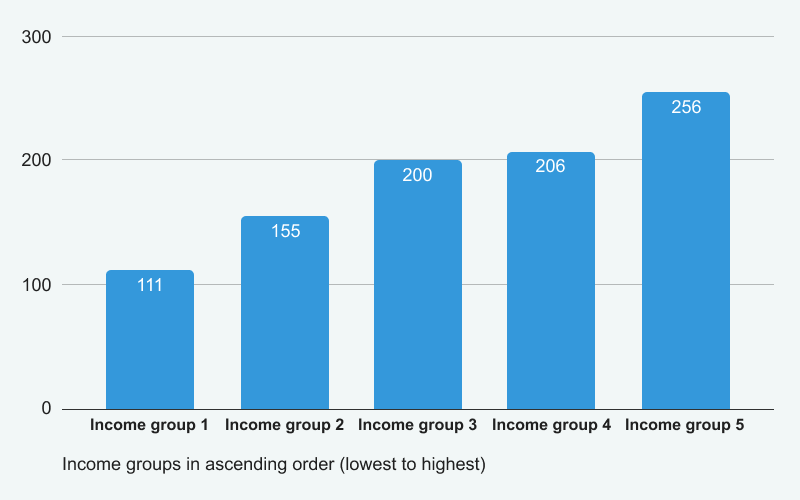
Income level and average expenditures on gambling (data from Statistics Canada)
Figures from 2019 show the lowest-income households, on average, spent C$111 on gambling, while the highest-income households spent C$256. We can deduce that after paying for rent, mortgage, utilities, and essential goods and services, there's more disposable income left for higher-income households.
It's important to note that there are limitations to such data, as people tend to underreport the amount of money they have used on gambling in surveys. Such a tendency has been revealed by Lottery Corporation, showing that purchases of government lotteries are underreported by more than 50%.
Gambling Differences Between Genders
Historically, gambling has always been perceived as a male-dominated venture, but now, with the increasing social acceptance of gambling, the gap is closing. Many stakeholders are seeking to be cognizant of the habits and preferences, including those of different genders.
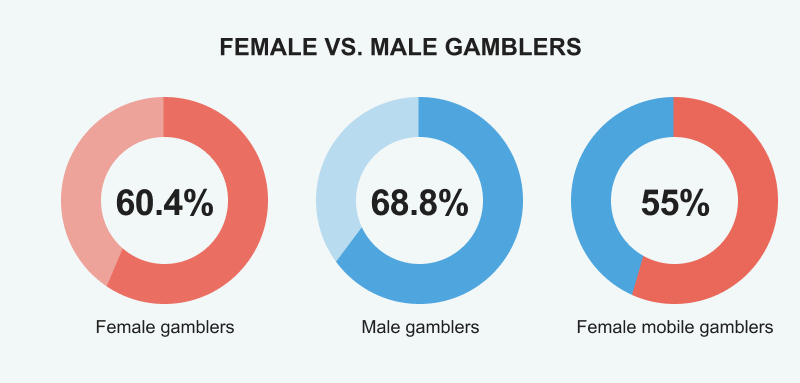
Gender distribution among gamblers in Canada (data from Statistics Canada)
Statistics Canada confirms that men are still more likely to gamble than women — 68.8% of men and 60.4% of women reported gambling in 2018.
This difference persists across:
- All age groups (the highest percentage in 45-65 years with 76% men and 68% women);
- Marital status (73% and 61% of those married or in common law relationships);
- Household income (the highest 20% of income is divided as 71% men and 67% women);
- As well as sexual orientation, racial group, indigenous identity, and immigrant status.
Interestingly, the lowest income bracket has an equal participation rate in terms of men and women who've gambled in the last year.
There is one aspect where women do surpass men – higher rates of gambling on mobile are more common for women players (55%).
Most Canadians Have Bought a Lottery or Raffle Ticket
A Statistics Canada report from 2018 revealed that out of 64% of Canadians who had gambled at least once that year, 55% did so by purchasing a lottery or raffle ticket. Since tickets are inexpensive, they are popular with different age groups. We assume the appeal of this game lies in simplicity and a prize pool that can reach millions of dollars.
What Forms of Gambling Do Canada's Players Enjoy the Most
Lottery is the king in Canada. Among two of the most popular types of gambling are lotteries and raffle tickets (51.8%), instant lotteries (scratch tickets), and instant online games (33%). Then, sequentially, electronic gambling machines, casino table games, sports betting, bingo, and other activities are less popular.
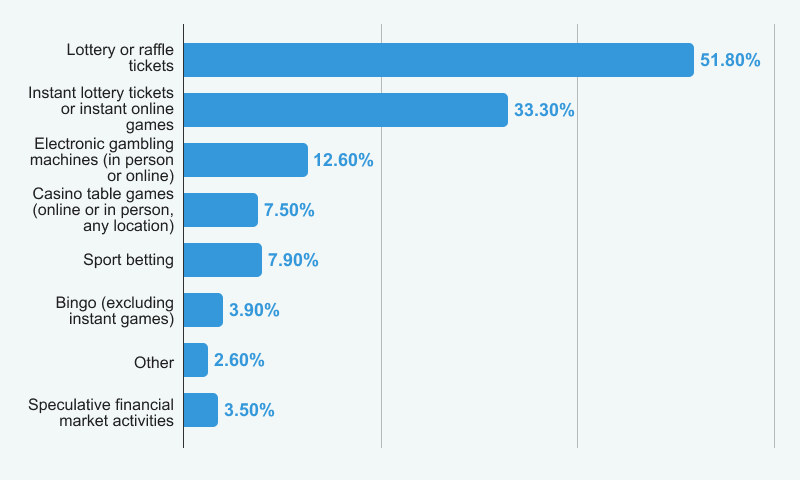
Most popular gambling activities in Canada (data from Statistics Canada)
This CCHS gambling rapid response survey also reflected that the top three forms of gambling are the ones players engage in the most frequently:
- Lotteries are played less than once a month by 24.4% of Canadians and one or more times a month by 27.4%;
- Instant win lottery and instant online games are played less than once a month by 19.8% of Canadians and one or more times a month by 13.2%;
- Electronic gambling machines (in-person and online) are played less than monthly by 9.8% of gamblers and at least once a month by 2.8%.
While the data reveals that there's a sizeable share of Canadians who engage in gambling, most do so infrequently. We found it evident across all types of gambling activities that most engage in them less than once a month.
Regarding online gaming, the CBCA audit revealed that across different age groups, there are differing preferences for games of online casinos.
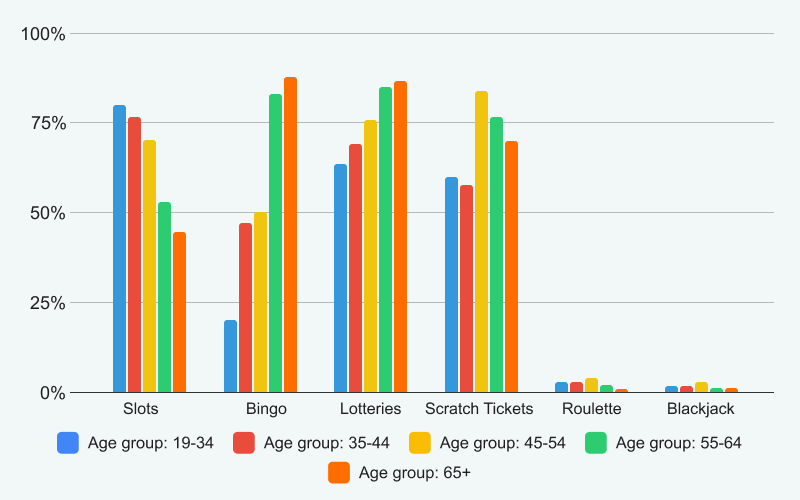
Online gambling preferences among different age groups (data from Newswire)
The common tendency is that younger adults prefer slots. As for bingo and lotteries, audit results suggest the opposite – the older the age group, the more they gravitate toward these kinds of games.
- Slots are mostly enjoyed by people from 19 to 44 years of age;
- Scratch tickets are the most popular for gamblers aged 45 to 64;
- Lotteries are the top choice for players in the age group of 55 to 65+, the same applies to bingo;
- Roulette and blackjack are significantly less played across all ages.
Understanding Problem Gambling and Its Risk Factors
A study from the year 2000, when online gambling was still relatively new, says that at the time, there was a lot of commotion regarding online gambling. It was considered more likely to induce addiction. The reasons are the availability of casino games from the comfort of home and particularly the impact on younger gamblers as they embrace internet technology in their daily lives. The same study notes that in 2000, gambling issue prevalence was around 3-5% among Canadians.
A more recent report from 2018 found that 3.4% of Canadians (636,000) were at low risk for gambling-related harms. While moderate to severe risk impacts 1.6% (304,000) of the Canadian population. Meanwhile, 64.5% of Canadians admitted having gambled at least once the previous year. As a result, only a small percentage of Canadians face serious gambling-related issues.
To determine whether the convenience and accessibility of online gambling have contributed to gambling-related harm rates, we compared figures from both of these studies. We determined that problematic gambling prevalence from 2000 to 2018 hasn't increased as in both periods it's at a 5% rate.
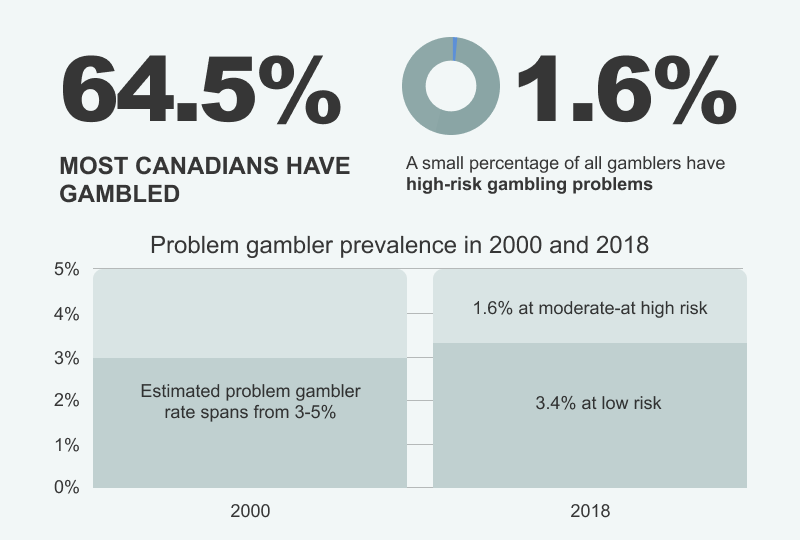
Problem gamblers in Canada (data from Statistics Canada)
Another study published in the Canadian Journal of Psychiatry in 2021 reinforces our previous conclusion. The data shows a decline in problem gamblers and suggests the overall landscape has improved.
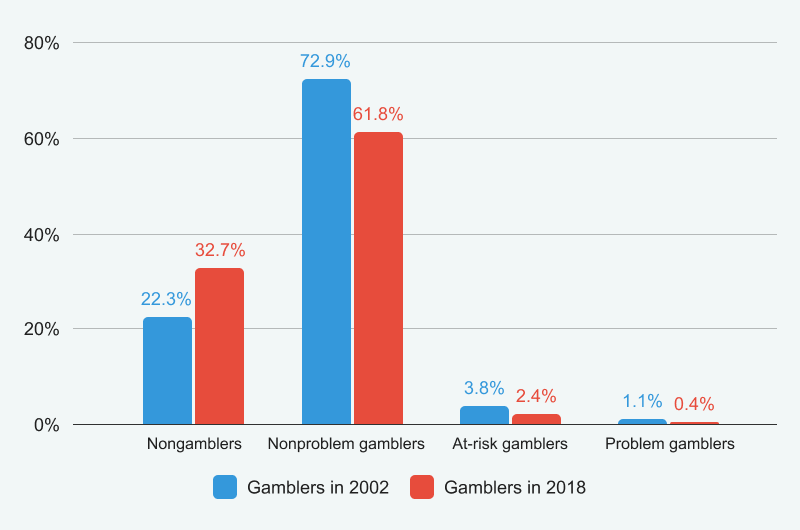
Changes in gambling behaviour over time (data from National Library of Medicine)
The statistics indicate that from 2002 to 2018, there's been a decline in gamblers by 10.4%. The non-problem gambler rate has also shrunk, but it's explained by the overall decrease of gamblers in the country.
The key gambling stats to evaluate are the at-risk and problem gambler percentages – both have decreased by 1.4% and 0.7%, respectively. Most recent data confirms that gambling-related issues in Canada have become slightly less prevalent. However, new studies would be required to reflect on the current situation more precisely, as the latest study on this matter at the time of writing this article was conducted six years ago.
People From Low-Income Households are More Vulnerable to Gambling Problems
The prevalence of gambling addiction has a close link with socioeconomic status. A smaller percentage of Canadians with lower incomes gamble when compared to those who are more financially secure. However, there's a connection between lower income levels and the likelihood of developing compulsive gambling habits.
A 2018 Canadian Community Health Survey has found that people from lower-income households are less likely to gamble than those from higher-income households, but they are more prone to gambling-related problems.
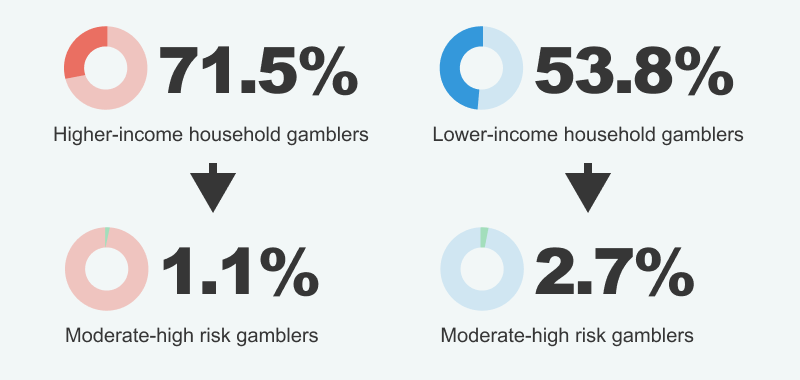
High-income vs low-income gamblers (data from Statistics Canada)
Of the 71.5% of Canadians from high-income households who reportedly gambled in 2018, only 1.1% were at moderate-to-severe risk for problem gambling. However, lower-income households present a different tendency – 2.7% of players out of 53.8% who gamble were at moderate-to-severe risk of gambling problems. It means that people from low-income households are almost twice as likely at risk of developing a gambling addiction.
The relation between gambling issues and low-income levels may stem from the perception of gambling as a way to improve the financial situation. In addition, higher-income individuals are more able to afford losses from gambling, so they are less affected. It's apparent that compulsive gambling contains multi-factorial circumstances – hence, additional variables contribute to the issue.
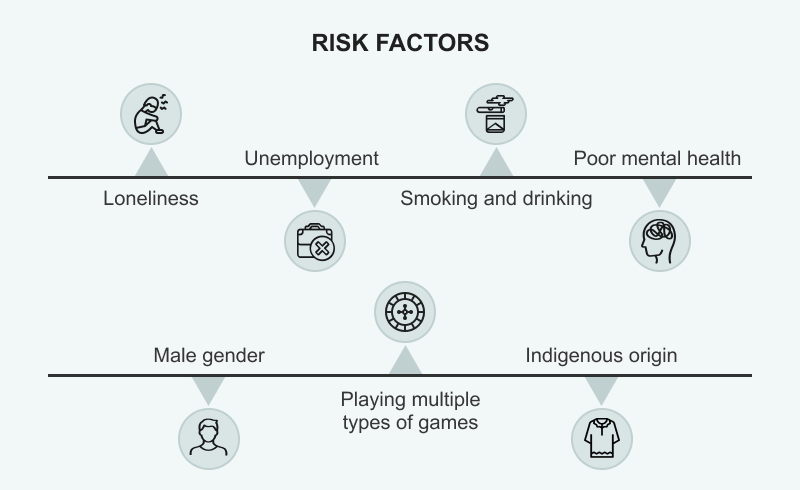
Risk factors associated with gambling problems in Canada (data from Statistics Canada)
Other aspects associated with gambling problems are the following:
- Being single or separated results in a lack of social support and increased proneness to behaviours like excessive gambling;
- When being unemployed, gambling is used as a coping strategy;
- Daily smoking and heavy alcohol use are considered to have common addiction triggers with gambling on a neurobiological level;
- Poor mental health lowers the threshold for compulsive gambling;
- Prevalence of gambling-related problems is more common among males than females;
- People who engage in multiple forms of gambling activities are more likely to be compulsive gamblers;
- Indigenous people are three times as likely to have a moderate-to-severe risk for gambling problems due to socioeconomic factors.
We concluded that the right concurrence of certain risk factors can trigger gambling problems in individuals from risk groups. Thankfully, Canadians have a relatively stable social and economic climate, resulting in a sliver of problem gamblers. Nonetheless, new advancements and the industry evolution may present new challenges that might influence the spread of gambling harms.
Is Advertising One of the Causes of Gambling Problems
Expansion of the online gaming market has led to a surge of gambling ads, particularly online. Not only have these ads become more frequent, but they also increasingly feature influencer and celebrity endorsements. Gambling brands are trying to capitalize on such marketing opportunities, but it has raised concerns among the Canadian public.
The situation escalated with the opening of the Ontario iGaming market in April 2022, which stimulated the rapid emergence of new Ontario online casinos, with new brands flooding the market and increasing ad volume significantly. Since then, Ontario has taken action by enforcing a ban in February of 2024 on using celebrities, athletes, and social media influencers in ads to promote gambling platforms.
An Ipsos survey from 2022 shows that about half of Canada's citizens deem gambling advertising excessive. Meanwhile, the majority of Canadians agree that gambling ads should be limited.
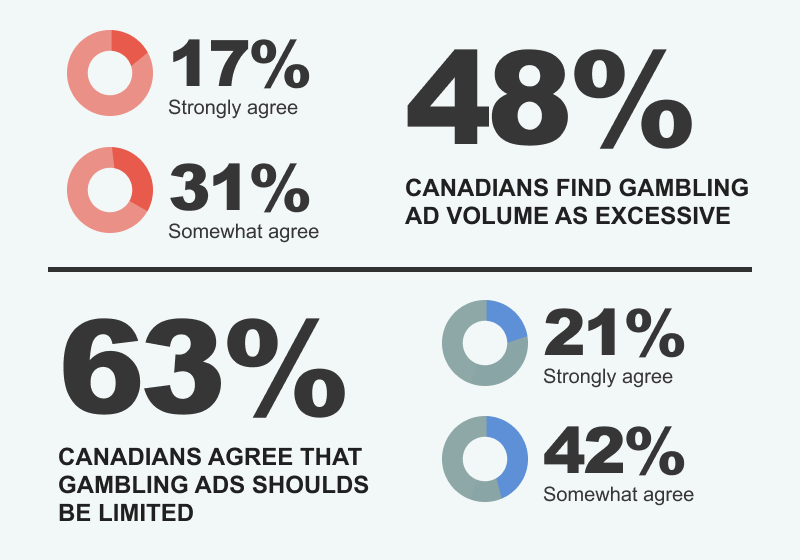
Survey on gambling advertising (data from Ipsos)
Considering the poll results, we can assume that most Canadians don't hold polarizing views regarding gambling ads, as only about a fifth of the respondents strongly agree with ad excessiveness and restrictions like cutbacks in volume.
The main concern with gambling advertising is that it allows operators to engage children and youth in gambling at a young age. A review by The Campaign to Ban Ads for Gambling found there is a connection between exposure to gambling ads and more positive views of gambling and increased gambling activity. In addition, evidence shows the younger population and those already vulnerable to gambling dependency are more likely to be influenced.
Conclusion
With the expansion of online gaming options in Canada, one would think problem gambling rates would increase. Yet, it was concluded that there's no direct link between more access to online casinos and sports betting options and gambling addiction.
In reality, gambling-related problems are complex and multifaceted. Compulsive gambling can occur within different societal groups. However, statistics show predisposing factors might impact some demographics more than others. Most significantly, low-income households are the most susceptible to developing gambling problems.
While there's no conclusive research on the connection between gambling-induced issues and advertisements, currently, it's been thought that ads may negatively affect the most defenceless societal groups – youth and those with underlying factors for problem gambling behaviour.
References
- How much is too much? Nearly half of Canadians think gambling ads have gotten out of hand
- The Impact of Advertising for Gambling by The Campaign to Ban Ads for Gambling
- The Case for Banning Gambling Advertising by The Campaign to Ban Ads for Gambling
- Gambling: Overview by Canada's Centre for Digital Media Literacy
- Exploring the Prevalence of Gambling Marketing: An Analysis of the Prevalence of Marketing Across Televised and Social Media Coverage of NBA and NHL in Ontario
- Celebrities exit sports gaming ads in Ontario
- The Ethics of Gambling Advertising
- Online Gambling: Canada by Statista
- Sales of lotteries in Canada in 2022 (in million Canadian dollars), by province or territory
- Sales of provincial and territorial lotteries in Canada from 2009 to 2021
- Who gambles and who experiences gambling problems in Canada
- Household spending by household income quintile, Canada, regions and provinces
- Gambling in Canada: Statistics 2020-2021 by Rhys Stevens, Institute Librarian & Information Specialist
- Online Gambling Statistics for Canada 2022
- Casinobonusca.com Reveals Most Popular Casino Games Among Canadian Players
- Canadian Gambling Behaviour And Attitudes: Summary Report
- Gambling Availability and Advertising in Canada
- Global Gambling Statistics & Trends 2024










